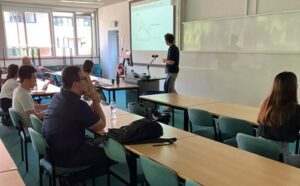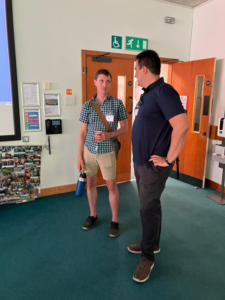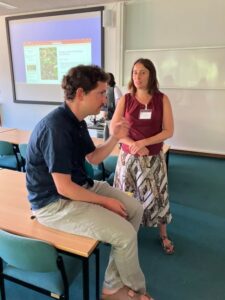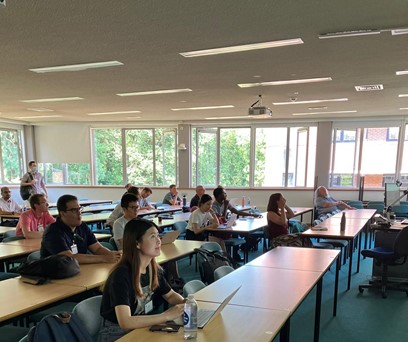The week of the 18th July 2022 was the hottest on record in the UK, a sweltering 40°C. The headlines were filled with climate change and how these extremes will be felt more frequently and intensely in the coming years. It was rather apt that it was also the week of the 8th Mathematical Models in Ecology and Evolution (MMEE) conference bringing together over 200 scientists whose research is centred in understanding and predicting ecological patterns, including responses to climate change. The conference was held at Reading University and LEMONTREE’s Sandy Harrison was on the organising committee.
The term eco-evolutionary optimality theory was talked about a lot over the course of the conference. However, in these contexts it was related to a single process, whereas LEMONTREE has the ambition to develop a LSM incorporating all processes. It is a very ambitious project indeed.
There were three sessions dedicated to vegetation modelling from the optimality approach which saw our LEMONTREE members take to the floor to present their research.
- Session 1: EEO and plant acclimation. Talks ranged from overviews in recent developments for leaf and sapwood respiration, predicting optimal temperature for photosynthesis, incorporating soil moisture responses, fire-adaptive traits and use of RSOfun.
- Session 2: carbon and nitrogen cycles. We heard talks on why functional balance determines carbon allocation, why Liebig’s Law might not be as relevant as thought, how to simply model global patterns of maximum LAI and fAPAR, empirical models for the control of leaf and plant properties related to N cycling, how nitrogen fertilization influences leaf N and growth rate (but not necessarily leaf-level photosynthesis) and how leaf C:N ratio has a predictable relationship to climate.
- Session 3: hydraulics and plant water regulations. We heard about the P-Hydro model which is an extension of the P model to make hydraulic properties explicit, a new approach for combining the least-cost theory with hydraulic limitations, an alternative optimality criterion for carbon-water coupling in plants and impacts of drought.
Thanks to all those that took part in the MMEE conference, especially given how incredibly hot it was. It was a great few days of knowledge sharing, and promoting the latest research in EEO and discussing ideas for future research.


Left: The audience listening to talks on EEO by the LEMONTREE team. Right, Beni Stocker presenting his research on modelling carbon and nitrogen cycles. Photos by Sandy Harrison.


LEMONTREE team members Dr Nick Smith and Dr Rodolfo Nobrega (left) and Dr Beni Stocker and Dr Alienor Lavergne (right). Great to see conversations and knowledge sharing continuing in the breaks. Photos by Sandy Harrison.
List of all the optimality talks
Session 1: General EEO and plant acclimation
- Dr Han Wang: Predicting plant functional traits from ecosystem processes from eco-evolutionary optimality
- Pascale Schneider: Using eco-evolutionary optimality principles to predict the thermal acclimation of the optimal temperature of photosynthesis
- Giulia Mengoli: Application of an optimality-based model to predict half-hourly carbon uptake and water release by ecosystem to include plant acclimation within a land-surface modelling framework.
- Yicheng Shen: Relationships between resprouting and fire regimes
- Dr Koen Hufkens: ‘rsofun’: a combine canopy-dynamic vegetation model framework
Session 2: Carbon and nitrogen cycles
- Prof Benjamin Stocker: Towards a resource economics paradigm for modelling carbon-nitrogen cycle interactions in terrestrial ecosystems
- Wenjia Cai: Eco-evolutionary optimality-based modelling of leaf area index
- Yunke Peng: Quantifying the coupled carbon and nitrogen metabolism of terrestrial ecosystems
- Dr Nick Smith: Modelling leaf responses to soil nitrogen variability: insights from model-data explorations using eco-evolutionary optimality theory
- Huiying Xu- Environmental controls of leaf carbon and nitrogen stoichiometry
Session 3: Hydraulics and plant water regulation
- Dr Jaideep Joshi: Towards a unified theory of plant photosynthesis and hydraulics
- Dr Xu Liang: An investigation of optimality in applications to land surface models.
- Prof Maurizio Mancuccini: Regulation of plant water status. The complementary problem
- Dr Julia Green: Drought impacts on water use and ecosystem productivity underestimated by earth system models.

